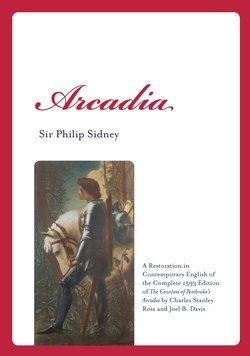Читать книгу Arcadia - Sir Philip Sidney - Страница 36
На сайте Литреса книга снята с продажи.
ОглавлениеThe First Eclogues
Undercover Lovers
The opening “brawl” (a dance in groups) announces the theme of unrequited love. Disguised as a shepherd and an Amazon, Musidorus and Pyrocles use indirection and various verse forms (elegiac, sapphic, and hexameter) to signal their true identities, but Pamela remains aloof, Philoclea uncomprehending. The eclogues end with Lamon’s low-style song in ottava rima stanzas, suitable for comic contrast while also suggesting a cosmic dimension when Claius pursues the heavenly beauty of Urania. (1593 ed. 38v)
Basilius, because Zelmane so would have it, used the artificial day of torches to light up the theatricals. Many shepherds having just arrived, he gently chastised their negligence by making them torchbearers. The others he allowed all freedom of speech and behavior, according to their accustomed method.
While the performers prepared themselves, Dametas, who much disdained all his old companions since his late increase in authority, brought his servant Dorus to make their acquaintance and join their play, while he himself stood over them like a director, nodding, gaping, winking, stamping, showing how he liked or misliked all these things that he did not understand.
First the shepherds leaped and gamboled to the tune of the pipes (which they held in their mouths even as they danced), making a right picture of their god Pan and his companions the satyrs. Then they cast away their pipes and hand in hand, in what seemed to be a brawl, danced to the cadence of their own voices singing some short couplets, the one half beginning, the other half answering. One half would say,
We love and have our loves rewarded.
and the other half would answer,
We love and are no whit regarded.
Then the first, again,
We find most sweet affection’s snare.
In the same tune, the choir would send it back,
Oh sweet but sour, despairing care!
A third time likewise,
Who can despair, whom hope does bear?
and the answer,
But who can hope, who feels despair?
Then joining all their voices, and dancing a faster measure, they would conclude with some such words:
As without breath no pipe doth move,
no music pleases32 without love.
Having thus varied both their song and dances in diverse sorts of inventions, in their last sport one of them would provoke another into expressing his secret passion. Thyrsis (accounted one of the best singers amongst them) had marked in Dorus’ dancing not only good grace and handsome behavior, but the extreme tokens of a troubled mind. Therefore with his pipe and then with his voice he challenged Dorus, and was by him answered thus: 33
pleases] Sidney wrote “kindly,” meaning, no music affects us naturally or pleasantly without love.
“The song contest was a standard fixture of the classical pastoral … but Sidney here plays the game in accordance with far more difficult rules, which he appears to have learned from the second eclogue of Sannazaro’s Arcadia and perhaps from the third song in the sixth book of Montemayor’s Diana [although] the content and phrasing are his own (Ringler 385).
